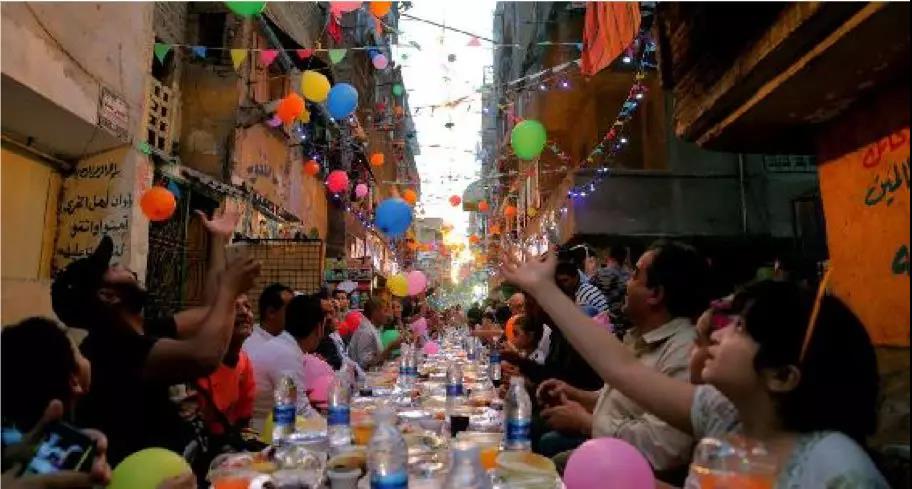-

评论
-

收藏
-

点赞

奇速英语阅读:阿拉伯斋月:50%食物吃不了只能倒进垃圾桶
阅读量:22731 2019.07.25 作者: 奇速小牛
奇速英语阅读理解:今天和广大英语阅读爱好者分享的主题是阿拉伯斋月:50%食物吃不了只能倒进垃圾桶。和几个世纪以来的穆斯林一样,在尼罗河上回响着祈祷的声音时,艾哈迈德·图菲克(摩洛哥宗教基金与伊斯兰事务大臣),小口吃着枣子,随后宣告斋月的结束。然后他转向面前堆积如山的盘子。
Arab states waste heaps of food during Ramadan
阿拉伯国家在斋月期间浪费大量食物
Hotels and restaurants have come up with some novel solutions
酒店和餐馆想出了一些新颖的解决方案
AS MUSLIMS HAVE for centuries,Ahmed Toufiq broke his Ramadan fast by nibbling a date while the call to prayer echoed across the Nile.Then he turned to the heaped plates in front of him.
和几个世纪以来的穆斯林一样,在尼罗河上回响着祈祷的声音时,艾哈迈德·图菲克(摩洛哥宗教基金与伊斯兰事务大臣),小口吃着枣子,随后宣告斋月的结束。然后他转向面前堆积如山的盘子。

He made short work of a fragrant lentil soup,but his pace slowed as he picked through salads and scooped dips with steaming pita bread.When he walked outside for a cigarette 20 minutes after sunset,a server collected half a plate of untouched kebab and rice.“Before iftar,you feel like you want to eat for two,”he said.
他迅速解决了一碗香喷喷的扁豆汤,但当他从沙拉中挑选并用热腾腾的皮塔面包蘸取蘸酱时,他的步伐放慢了。当他在日落后20分钟走到外面吸烟时,一名服务员收集了半盘没动过的烤肉和米饭。他说:“开斋前,你会想要吃两人份。”
Arab states waste a lot of food.A study in 2016 by the Economist Intelligence Unit,our sister company,found that Saudi Arabia bins 427kg per person annually,triple the average in Europe and North America.
阿拉伯国家浪费了很多食物。2016年,我们的姐妹公司经济学人智库的一项研究发现,沙特阿拉伯每年人均扔进垃圾桶427公斤食物,是欧洲和北美平均水平的三倍。
Some may chalk this up to traditions of hospitality:even a“light lunch”in Cairo or Beirut leaves guests in a torpor.The reasons are more varied,though.Half of the fruits and vegetables grown in Egypt are never eaten because they are often moved to market in open-air trucks and wilt quickly in the heat.
有些人可能把这归因于好客的传统:即使是在开罗或贝鲁特吃一顿“清淡的午餐”,也会让客人感到昏昏欲睡。然而,原因是多种多样的。埃及种植的水果和蔬菜有一半从未被食用过,因为它们经常被搬到露天卡车上,在高温下很快就会变蔫。
The problem gets worse during Ramadan.Residents of the United Arab Emirates each produce an extra 1.8kg of waste per day in the holy month,a 67%increase.Food accounts for 55%of Dubai’s trash,up from 22%in other months.Bahrain’s food waste increases by half to 600 tonnes daily.
在斋月期间,问题变得更糟。在这个神圣的月份,阿拉伯联合酋长国的居民每人每天产生1.8公斤的额外垃圾,(比平时)增加了67%。食品垃圾占迪拜垃圾总量的55%,高于其他月份的22%。巴林的食物浪费每天增加一半,达到600吨。
Buffets are a major culprit,especially in the Gulf,where hotels and restaurants often serve through the night.A study by researchers at Masdar,a state-owned renewable-energy firm in Abu Dhabi,found that just 53%of food at iftar buffets is eaten.

自助餐是罪魁祸首,尤其是在海湾地区,那里的酒店和餐馆经常通宵营业。阿布扎比一家国有可再生能源公司马斯达尔的研究人员进行的一项研究发现,开斋自助餐中只有53%的食物被食用。
This is an expensive waste.Some governments see it as a security risk,too.The region is a net food importer.In the weeks before Ramadan,state-run media admonish their citizens to be less wasteful.On social media diners now swap recommendations not on lavish buffets but onàla carte options.
这是一种昂贵的浪费。一些政府也将其视为安全风险。该地区是粮食净进口国。在斋月前的几周,官方媒体告诫他们的公民少浪费。在社交媒体上,食客们现在交流探讨的不是奢华自助餐的推荐,而是点菜的选择。
Autocratic regimes that frown on civil society are happy for their citizens to take up the cause of food waste.Wahab,a Qatari startup,sends volunteers to collect leftovers from hotels and restaurants.
反对公民社会的专制政权乐于让他们的公民承担食物浪费的责任。卡塔尔初创企业瓦哈卜则派出志愿者去收集酒店和餐馆的剩饭剩菜。
A few hotels in Dubai have installed cameras and scales to track what winds up in the bin.Chefs use the data to cook less of the unpopular dishes.One Hilton property says the system cut buffet waste by 70%.Others are doing away with the buffet altogether—if not for iftar then for suhour,the pre-dawn“dinner”.
迪拜的几家酒店已经安装了摄像头和秤来追踪什么东西被丢进垃圾桶。厨师们利用这些数据来减少不受欢迎的菜肴。希尔顿酒店表示,该系统减少了70%的自助餐浪费。其他酒店则完全取消了自助餐——如果不是为了开斋,那么就是为了suhour(穆斯林斋月节期间(日出后日落前)不准饮食。每天日出前饮食叫suhour),即黎明前的“晚餐”。
A growing number of restaurants advertise prix fixe menus as a waste-free way to break fasts.These meals are also cheaper.A lavish hotel buffet might cost 200 dirhams($54).Set menus are about half that.
越来越多的餐馆宣传固定价格菜单是一种无浪费的打破禁食方式。这些食物也更便宜。一个豪华的酒店自助餐可能要200迪拉姆(54美元)。固定菜单其价格的只有一半。
Egypt’s national food bank feeds about 1.8m families during Ramadan.Some of the food is sourced from hotels that package leftovers.For health reasons,though,uneaten food from a customer’s plate must be thrown away.After 15 hours of fasting,eyes are bigger than stomachs.Cameras will not help.So one Cairo hotel found a low-tech solution for its buffet:it made the plates smaller.
埃及国家粮食银行在斋月期间为大约180万家庭提供食物。有些食物来自打包剩菜的酒店。然而,出于健康原因,顾客盘子里的剩下的食物必须扔掉。禁食15小时后,他们的眼睛变得比胃还大。摄像头的作用微乎其微。因此,开罗一家酒店为自己的自助餐找到了一个低技术含量的解决方案:让盘子变小。
在斋月前的几周,官方媒体告诫他们的公民少浪费。在社交媒体上,食客们现在交流探讨的不是奢华自助餐的推荐,而是点菜的选择。更多奇速英语阅读资讯,请持续关注奇速英语官网:www.qisuabc.com










